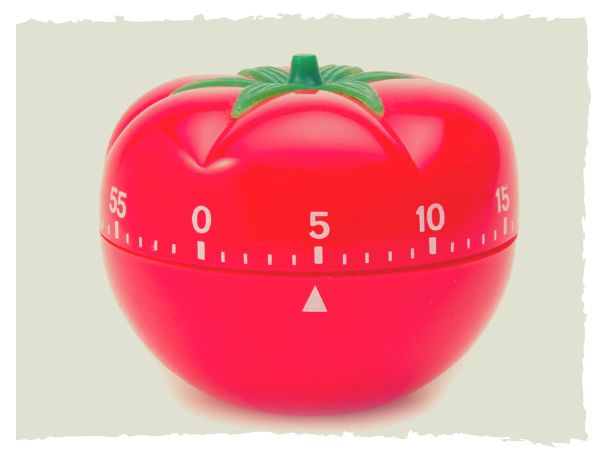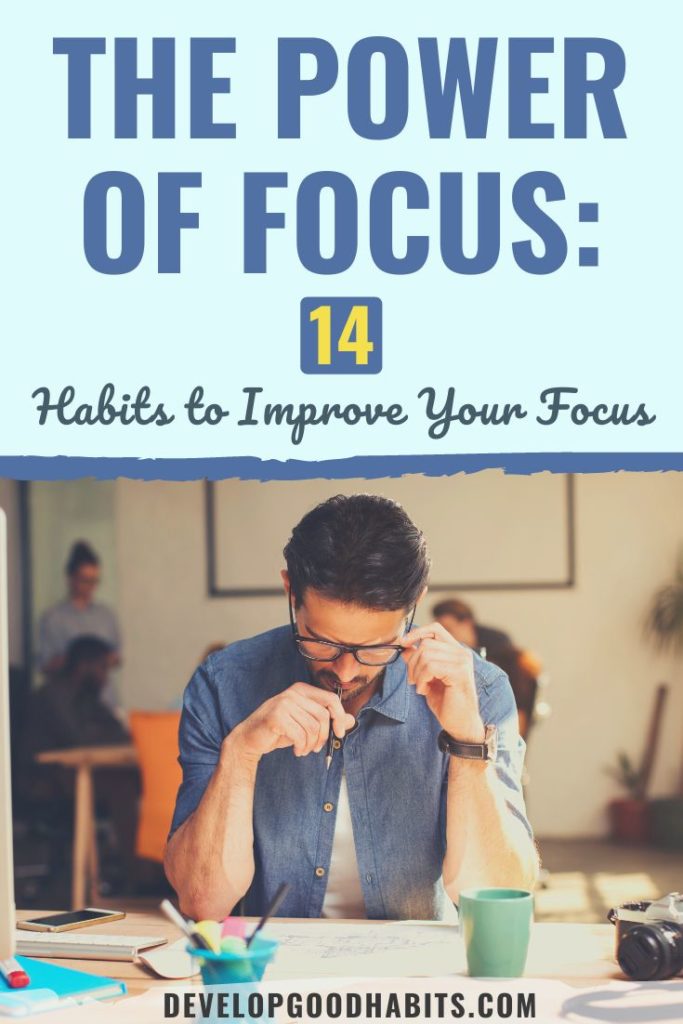Do you struggle to stay focused on the task at hand?
Do you feel like you could do so much more and be more successful if you could only focus better?
Are you interested in tried and true strategies to help sharpen your focus and improve your lifestyle?
If so, read on to discover these 14 habits to improve your focus
Here we go over 14 habits that you can work on to sharpen your focus and get the most out of your day. Whether it's work, studying, or your side project, better focus will help you feel better and do more!
Let’s start with a simple definition.
What is the Power of Focus?
In today’s fast-paced world where we are always on the go and constantly overstimulated by technology, it can be harder than ever to focus. However, if you can master the power of focus, you will get more things accomplished in less time and improve various aspects of your life.
Focus means putting all of your energy and thoughts into a particular thought, task, or goal for a specified amount of time; and no matter how focused you think you are, there are always ways to improve.
Focus is a skill, a skill that can be tough to develop at times, but between juggling a family, a demanding job, a commute, my blog, and the other aspects of my life throughout the years, I have developed habits and tips to improve focus.
The purpose of this article is to help you improve your focus with small simple exercises that you can do every day. If you follow these tips and work on them little by little you will improve your focus.
With this new power of focus you will have better self-confidence and enhanced willpower and you can accomplish your goals.
Improving focus is a lot like building muscles.
Improving your focus, just like getting stronger, doesn’t happen overnight. Instead, you work on it little by little, every day without fail, and you will start to see improvements.
And just how having a better health routine will have a positive impact on other aspects of your life, sharpening your focus will too.
Improved focus improves a wide variety of goals, such as:
Focus is improved by overcoming the temporary discomfort that comes with new challenges and the inevitable setbacks to staying on task. That's why the power of focus is such a valuable skill to have.
1. Avoid Multitasking
Many of us feel like we are getting more done when we multitask, However, this is not true!
When you try to divide your focus on multiple tasks it almost always ends up taking more time, and it can be much more stressful.
When you focus on one task at a time it helps you focus and finish more efficiently. Also, each time you finish a task you will get a sense of accomplishment that will help you stay motivated for your next ones!
Action Item: Make a “to-do” list and focus on getting one task done at a time. Check off each item as you finish it and see that it feels great to finish one thing in entirety and move on to the next!
2. Eliminate distractions
Whether you work from home or in the office, it seems like distractions are infinite, and sometimes it can be pretty difficult to figure out how not to get distracted.
What you need to do to avoid distractions will vary depending on what distracts you most, but you can try some things like:
Action Item: While you are working one day make a list of the things you catch yourself being distracted by. You can then develop strategies to reduce those distractions while you are working.
3. Use Focused Blocks of Time
Many people struggle to stay focused just because they have so many different things to do and they feel overwhelmed.

A solution to this is to break your day and/or tasks into time blocks where you focus, then take a break. You may have to experiment with which works best for you but the Pomodoro Technique is a strategy that works for many people!
In this model you focus hard for 25 minutes, take a 5 minute break, then get to work again. After 4 “pomodoros” you can take a longer break, and so on!
Action Item: Organize your day into time blocks of “focus” and “taking a break” so that you can use your time efficiently and get everything done, without burning out too quickly!
4. Take breaks between work/study sessions
If you never take a break, there is no way you will be able to stay focused on your work or studies!
Believe it or not, taking breaks throughout the day will help you finish your tasks sooner!
People are not machines, so it is important to take a break, stretch, have a healthy snack, get some water, go for a small walk, or whatever it is that helps you to reset so you are able to sit back down and actually focus while you are working.
Action Item: Set alarm reminders to ensure you take small breaks throughout the day so you are able to focus 100% while you are sitting and working.
5. Practice mindfulness
Mindfulness simply means that you put all of your energy and focus into the thing that you are doing at that time.
For example, when people eat they often watch TV or look at their phones, but what we should try to do is focus on our food. Enjoy it, stop multitasking, and be present in the moment. Be mindful.
Small and short mindfulness exercises, like stretching and focusing on how your body feels, or sipping on your coffee while doing nothing else but thinking about the flavors and aromas, can help to sharpen your focus for other everyday activities.
So next time you take a short break, try to be more mindful about the activity you are doing.
Action Item: Use your work or study breaks to practice mindfulness. Focus entirely on what you are doing while you do it, both to sharpen your focus and to give your brain a rest from the hustle and bustle. You can try some of the suggested 5-minute mindfulness activities here.
6. Think About Your Goals
One of the keys to focus is keeping your motivation and goals in mind. If you take a moment to really think deeply about what you want to accomplish, it can be a lot easier to focus.
Think about what your success looks like. Think about what it'll take to get it. Think about how you feel once you actually achieve it.
Can you see it? Can you imagine the sense of accomplishment, the confidence, and the joy you will feel when you achieve your goal?
Great. Because most people don't do that.
And if there's one secret to developing the kind of focus that helps you smash through your obstacles, it's to imagine that you've already achieved your goal.
Imagine how you would feel, where you would be, what it would look like, and what others would say.
This is the way to take your goal from being a dry lifeless wish to a vividly burning desire… A desire that’ll give you the motivation, strength and mental fortitude to push forward, no matter how many obstacles get in your way.
So, to help sharpen your focus, you have to develop the habit of thinking about what you want – vividly.
Action Item: Close your eyes and think deeply about a goal you want to achieve. Tell yourself that you’ve ALREADY achieved it and feel the happiness and confidence that it gave you. Keep thinking about the details – where you are, who’s around you, and what you did to achieve this goal.
7. Be Grateful in Advance
Now that you know exactly what you want, the next step to developing focus is to be grateful.
It might sound strange, but gratitude helps to develop focus because when you're grateful, you train your mind to look for the good in every situation.
By being grateful, you are focusing on your present situation. You also become more aware of your present opportunities and of the people around you that can help you reach your goal. Lastly, being grateful for what you have now helps you see what steps you need to take to achieve your goal.

Think about it, people who are successful and have achieved their goals did not do so by complaining and feeling sorry for themselves.
So, get in the habit of being thankful. Be thankful for your hardships. Be thankful for where you are in the process. Be thankful for your setbacks. Be thankful for the people in your life.
When you're thankful and grateful your mind will start seeing opportunities that it did not see before.
So get in the habit of being grateful for your goal before you’ve achieved it. It will help increase your focus because you’re training your brain to stay positive no matter what.
Action Item: Think about 3 things that you’re thankful for right now. To make it even more valuable, think of 3 obstacles you’re facing and list reasons why you’re grateful for them. If you need some inspiration you can check out these Things to be Thankful For.
8. Be Ruthless With Your Time
Ruthlessly cut out “fluff” tasks and focus on the main steps needed to achieve your goals – delegate everything else.
The best way to do this is to have a to-do list that you actively work on every single day.
It can be extra satisfying to write down your to-do list on a Post-it note where you can physically scratch off tasks as you complete them!
But there are plenty of online to-do list apps on your phone you can use to help you be more ruthless with your time.
The point is that you want to be purposeful with your time and focus your attention on the things written on your to-do list. Don't allow distractions or other last-minute items to take you off task unless they are on your to-do list.
By planning out your day, you are increasing your focus on the important tasks that you’ve defined for yourself ahead of time, rather than letting distractions creep up on and steal your attention.
Action Item: Being ruthless with your time means prioritizing tasks and deciding what is worth your time, and what isn’t. You can use the Eisenhower Matrix to help you make decisions on when you should do things, or if you should do them at all.
By placing things into a matrix of 4 categories: Urgent, Not Urgent, Important, and Not Important, you can decide what you 1) Do first 2) Plan 3) Delegate 4) or Delete all together. You can see details on the Eisenhower Matrix here!
9. Create “Layers” of Focus
Do the easy stuff and follow it up with harder stuff. The feeling of accomplishment and confidence will enhance your focus – not deplete it. Things like:
Doing these low-effort things makes you feel more accomplished and is a powerful visual cue when you see that your to-do list has things scratched off it. You have accomplished things, and this improves your focus!
This is another reason that having a to-do list is so important! Put a few low effort items first and then your main priorities after, so you can get the sense of accomplishment and a boost of self-confidence to stay motivated and focused throughout the day.
Action Item: Right now, do the tasks on your to-do list that would take no more than two minutes to do. Just get them done – now! You will see how good it feels.
10. Pay Attention to HOW You’re Eating
Many of us eat too much and too fast.
Be mindful and present when you eat. Sit down, chew slowly, appreciate the flavors, and simply enjoy your food. This will help you feel more full and more satisfied with your meals. This makes eating more enjoyable and can even help you lose weight!
This is a classic technique that my wife uses as a dietitian to help her clients feel more full and more satisfied after a meal.
The sneaky thing is that by focusing on this mindful eating you also improve your overall focus.
Action Item: Sit down at a table and eat. No T.V. or cell phones. Eat your food and be conscious of how it tastes and feels. Enjoy your food and notice when you start to feel full. Listen to your body and allow yourself to easily stop eating when you feel full and satisfied.
11. Devise a Bedtime Routine
If you're fatigued and not eating well you won’t have the energy needed to focus on much of anything. And the sad truth is that most of us don't eat properly or get enough sleep.
Focus on having the same bedtime every night.
You want to build the habit of going to sleep on time and to listen to your body by being more aware and focused on how you feel and when you are tired.
That way you give your body what it needs – which is proper rest.
Most of us ignore when our body is tired, staying online longer, watching just one more next Netflix show, or playing games on our phone when we should really be going to bed.
So focus on the structure of your evenings so that you naturally go to bed when your body is telling you that it needs rest. Not whenever you “feel tired”.
Action Item: Plan out your evening and set a bedtime. Notice how you feel throughout the evening and head to bed when your body gives you cues that it is tired.
12. Make a Game of Clearing Up Clutter
Clear up your desk, your car, your room so that you feel calm, peaceful, and serene.
One fun way that we clean up clutter with our kids is to set a timer for just 5 minutes and make a game out of it. Whoever puts away the most stuff wins!
Get in the habit of clearing off your office desk at the end of the day. Get in the habit of cleaning up the kitchen before you go to bed. Get in the habit of clearing out your inbox.
You don't want any unnecessary distractions to deplete your focus. Plus the simple act of working on these small organizational tasks every day helps to strengthen that old focus “muscle”.
Action Item: Look at the space around you and for the next 3 minutes, start clearing up items that can be put away somewhere out of sight or tucked away (trash can, bookshelf, etc.)
13. Reward Yourself
Make a game out of completing your daily routine. Humans are motivated by incentives and punishments, so make sure that you set up a reward for accomplishing your tasks. You want to build positive associations around accomplishing your goals.
You will channel these feelings of accomplishment into focusing on your bigger goals, so it’s important to reward yourself for staying on task.
Another tip for improving focus that I've learned is that when you do get distracted, or don't complete items on your to-do list, or don't keep a commitment that you've made yourself, there needs to be a consequence.
Consequences for failing your focus challenges are extremely important because when you don't do something that you know you should, you feel a tiny bit of guilt and if that guilt is allowed to fester it will deplete your feelings of positivity and motivation. A guilty conscience is utterly counter-productive.
I’m not saying to “punish” yourself. But I am saying there has to be a consequence so that you feel like you've “atoned” for slipping up.
One great “consequence” that you can have for yourself is to donate to a cause that you believe in. That way you still feel good about yourself and are able to channel those positive feelings towards your goals again; this will help you maintain your focus.
Action Item: When you are making your to-do list, also plan out rewards for getting things done, and a low-risk consequence for if you don’t complete something. If you need inspiration, check out these ways to reward yourself.
14. Focus on Your Posture
The final way to improve focus is to pay attention to your own body.
Focus on your posture when you're standing. When you're sitting in the car. When you're walking. Etc.
Focus on making sure your spine is straight. Make sure your shoulders are back. Your head should be upright.
Good posture is important. It helps you be healthier. It makes you more efficient. Focusing on your posture also gives you a tool to help you improve your focus.
Action Item: Right now, as you’re reading this article, straighten your back, pull your shoulders back, and keep your head upright. Notice how good it feels and do this throughout the day.
Final Thoughts on Ways to Improve Focus
Focusing better will help you to be more efficient, successful, and all around happier.
There are many ways to improve focus, like making a to-do list, creating focus blocks, thinking about your goals, and more.
Little by little you can train your “focus muscle” to be stronger, and you can achieve anything you put your mind to.
If you want more tips for focusing on your goals and avoiding distractions then check out this article that show you how to stay focused on your goals and avoid distractions.
About the Author: Raza Imam writes about simple strategies and tips regular people can use to get healthier, stronger, and leaner. Check out Raza’s book, “30 Days of Focus” on Amazon.com.



I like the simplicity of those steps. #1 & #2 are huge!
#8 has never worked for me. I prefer to put obstacles beetwen me and distractions, e.g. a blocksite plugin. A hurdle to achieve my distraction is a ‘punishment’ in itself. And my best reward is getting the things done. This is such a good feeling.
Michal,
Yeah, Raza has a great list. I think these things are not cookie cutter. They are all worth trying but some work better than others. For me #3 is the KEY! When I am not ruthless with my time I begin to find myself easily distracted. Thanks for a great comment! (as always)
Thanks Jackson. Appreciate it. Everyone reading this should head over to his site and check out that podcast too. No such thing as learning too much! 🙂
We are what we think as we desire so do we become! By our thoughts, desires, and habits, we either ascend to the full divine dignity of our nature, or we descend to suffer and learn.
Live #4. Mark Twaim is quoted as saying “Eat your frog for breakfast” meaning to do the tasks you dread first. Do this and the rest of the day becomes easier. It is sow thing I practice each and every day.
Great article
100% right. I have been doing the “eat the frog” for my tasks for years. Getting rid of those tough tasks first does make the rest of the day run so smoothly.